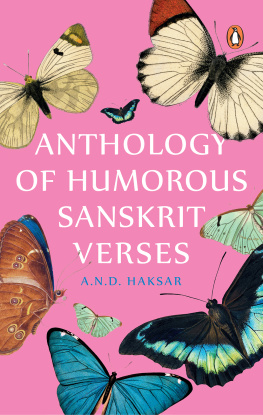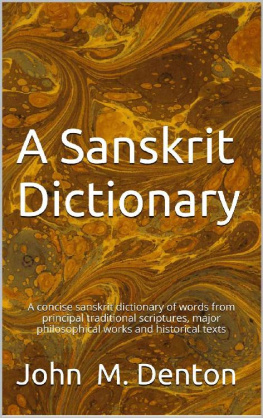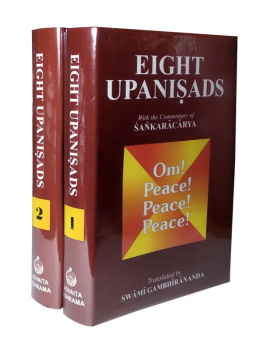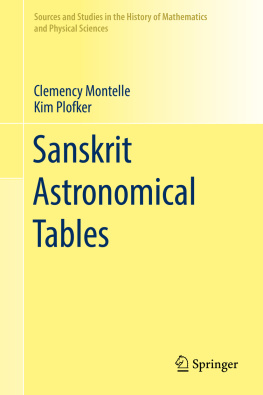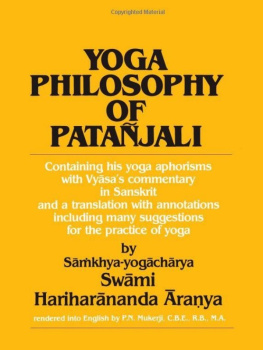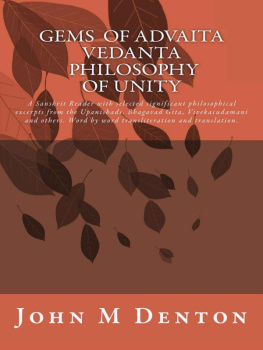S. Venkataramanan - Select Works of Sri Shankaracharya
Here you can read online S. Venkataramanan - Select Works of Sri Shankaracharya full text of the book (entire story) in english for free. Download pdf and epub, get meaning, cover and reviews about this ebook. year: 2018, publisher: Global Grey ebooks, genre: Religion. Description of the work, (preface) as well as reviews are available. Best literature library LitArk.com created for fans of good reading and offers a wide selection of genres:
Romance novel
Science fiction
Adventure
Detective
Science
History
Home and family
Prose
Art
Politics
Computer
Non-fiction
Religion
Business
Children
Humor
Choose a favorite category and find really read worthwhile books. Enjoy immersion in the world of imagination, feel the emotions of the characters or learn something new for yourself, make an fascinating discovery.
- Book:Select Works of Sri Shankaracharya
- Author:
- Publisher:Global Grey ebooks
- Genre:
- Year:2018
- Rating:3 / 5
- Favourites:Add to favourites
- Your mark:
- 60
- 1
- 2
- 3
- 4
- 5
Select Works of Sri Shankaracharya: summary, description and annotation
We offer to read an annotation, description, summary or preface (depends on what the author of the book "Select Works of Sri Shankaracharya" wrote himself). If you haven't found the necessary information about the book — write in the comments, we will try to find it.
Select Works of Sri Shankaracharya — read online for free the complete book (whole text) full work
Below is the text of the book, divided by pages. System saving the place of the last page read, allows you to conveniently read the book "Select Works of Sri Shankaracharya" online for free, without having to search again every time where you left off. Put a bookmark, and you can go to the page where you finished reading at any time.
Font size:
Interval:
Bookmark:
SELECT WORKS OF
SRI SANKARACHARYA
ENGLISH TRANSLATION
BY
S. VENKATARAMANAN
1921
Select Works of Sri Sankaracharya by S. Venkataramanan.
This edition was created and published by Global Grey
GlobalGrey 2018

globalgreyebooks.com
The main object of this publication is to present, in simple English, some of the works of Sri Sankarchrya in which he tried to expound, in a popular style, the philosophy of the non-dualistic Vednta of which he was the well-known founder. With this view the present translation has been rendered free of technical words and phrases, and, in some instances, literal and technical accuracy has been purposely sacrificed in order to make the translation readable and comprehensible by itself independently of the text. It is however hoped that the juxtaposition of the Samskrit text and the English translation will serve the double object of enabling the student of Samskrit to understand the text better and to correct, by a reference to the text, any defect of expression in the translation as an inevitable result of the attempt to garb it in a popular style. To those that have had no training in metaphysics or dialectics and have neither the leisure nor the capacity to read the original standard works of Sankara,mostly elaborate commentaries on the Vednta aphorisms, the Bhagavad-gta and the Upanishadsa publication of this kind should be specially helpful for a proper understanding of the broad outline of Sankara's philosophy of non-dualism. The main feature of that philosophy, as will be apparent from a study of the following pages, may be summed up very briefly as follows. Samsra or phenomenal existence, whose mar factor is the bondage of births and deaths it succession, is unreal and is the result of illusion.the ignorance by which the only and absolute reality, the Supreme Self, is mistaken for the unreal world, in the same way as a rope may be mistaken for a serpent in the dusk of the evening. Both bondage and liberation are thus illusory, for, since there is no real bondage at all, how can there be a liberation from it? Yet, liberation or moksha is relatively spoken of and can only result from a thorough knowledge of the reality behind and beyond and underneath and within the unreal. Sankara emphasises the fact that such knowledge is not a mere theoretical one which can be gathered from books or lectures, but is of the nature of direct realisation or actual experience. The sole source of this knowledge is a clear and accurate understanding of the Vedic text "That thou art," but, however much one may analyse its meaning by means of his own reason or with the aid of commentaries, the direct realisation of the self cannot take place unless the Vedic text in question reaches the student through the mouth of a spiritual teacher (the guru). It is then, and only then, that the disciple realises in a flash, as it were, "I am Brahman," the individual soul is seen, at all times and in all conditions, to be identical with the Supreme Self, and the knowledge springs up that all this is indeed the Self and there is naught but the Self. This is the highest goal of spiritual endeavour, the moksha or liberation of the Vedanta philosophy. Further detail would be out of place in a short preface of this kind, but the translator feels bound to call attention to one very prominent teaching of Sankara which will be evident from a perusal of the present publication,namely, that devotion to a personal God (Saguna-Brahman) is not inconsistent with the true Vedanta philosophy, but, on the other hand, spiritual perfection or liberation is impossible without the grace of God attainable by devotion and the grace of the Master (guru) who alone can reveal the true nature of the Self to the ardent aspirant for the Absolute that is beyond all word and thought.
The Translator.
I praise, with devotion, the All-pervading (Vish u), Who, Himself without origin, is the origin of the universe, in Whom this wheel of samsra revolves in this wise, and, on realising Whom, this wheel of samsra is destroyedthat Hari, the destroyer of the darkness of samsra , I praise. (1)
Him, from a single aspect of Whom this whole universe has sprung into existence, by Whom again it is held together in this manner, by Whom it is pervaded, and by Whom it is illumined through pleasure and pain,that Hari, the destroyer of the darkness of samsra, I praise. (2)
Him, Who is all-knowing, Who is indeed all and perfect, Who is bliss itself, Who resides in the qualities and has therefore endless attributes, Who is the Unmanifest that differentiates the undifferentiated, and Who is both the real and the unreal,that Hari, the destroyer of the darkness of samsra, I praise. (3)
There is naught else than Him; yet, this universe is not his real nature. He is not the objective world, for He is of the nature of nonobjective consciousness. And though He is devoid of the distinction of the knower, knowledge and the known, He is nevertheless always the knower,that Hari, the destroyer of the darkness of samsra, I praise. (4)
Him Who is realised as the Supreme Lord by those who, having learnt from proper preceptors the extremely subtle nature of the Immutable, are engaged in the contemplation of the ultimate Unity with the help of renunciation, constant meditation and firm devotion,that Hari, the destroyer of the darkness of samsra, I praise. (5)
Him Who is realised as "I am the self-resplendent Self" when, by the control of the life-forces, the mind is confined within the heart amidst the repetition of the sound Om and, all other memory being excluded, is merged therein and is finally dissolved,that Hari, the destroyer of the darkness of samsra, I praise. (6)
Him Whom the knowers of Brahman realise by meditation as the Supreme Lord within themselves known as Brahman, as the second-less, infinite, unborn, subtle, inscrutable Resplendence residing in the heart and attainable only by devotees,that Hari, the destroyer of the darkness of samsra, I praise. (7)
Him Who is understood as the unsurpassable bliss realisable only by the spirit by those who perceive within their own hearts That which is beyond the senses, being realisable only by the expansion of the individual self, and beyond the cognisable, being cognition itself,that Hari, the destroyer of the darkness of samsra, I praise. (8)
Him Whom, the Unborn, sages like Sanaka meditate upon by understanding that every object of perception has an underlying reality and is identical with Brahman and by realising "I am That",that Hari, the destroyer of the darkness of samsra, I praise. (9)
Him Whom the knowers of the Self know as the Supreme Lord "in whom I am" by eliminating as not-I whatever is perceptible, and by realising that bliss which is self- resplendent consciousness,that Hari, the destroyer of the darkness of samsra, I praise. (10)
Him in Whom the devotees of the Immutable, forsaking their bodies, merge themselves by realising Him as the pure self-resplendent Self, infinite like space, as That which alone remains when all that is cognisable and differentiated is eliminated step by step,that Hari, the destroyer of the darkness of samsra, I praise. (11)
Him Who is in all, Whose body is this all, and yet Who is not this all, Who knows all, but Whom none knows at all, and Who, as stated above, holds all this together, being the inner spirit thereof,that Hari, the destroyer of the darkness of samsra, I praise. (12)
Him Who is realised as "I am the One that is the All" by those who see, by their reason, all this universe as existing within themselves and their own self as the Unborn residing in the heart of all beings,that Hari, the destroyer of the darkness of
Next pageFont size:
Interval:
Bookmark:
Similar books «Select Works of Sri Shankaracharya»
Look at similar books to Select Works of Sri Shankaracharya. We have selected literature similar in name and meaning in the hope of providing readers with more options to find new, interesting, not yet read works.
Discussion, reviews of the book Select Works of Sri Shankaracharya and just readers' own opinions. Leave your comments, write what you think about the work, its meaning or the main characters. Specify what exactly you liked and what you didn't like, and why you think so.


